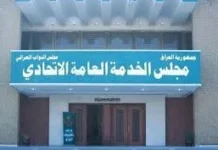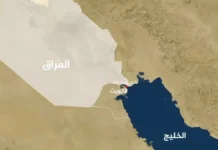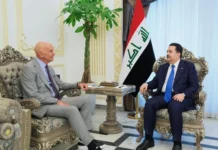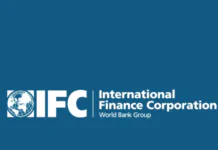Tishwash: Iraqi Parliament Approves First Amendment to General Budget Law for 2023-2025
The Iraqi Parliament voted, on Sunday, on the draft law of the first amendment to the Federal General Budget Law of the Republic of Iraq for the fiscal years (2023 – 2024 – 2025) No. (13) of 2023.
For his part, independent MP Ahmed Majeed announced in a statement to Shafaq News Agency that members of the House of Representatives from the central and southern governorates boycotted the parliament session held today, considering that voting on the budget is “a violation of the law and the internal regulations of the council due to the lack of a legal quorum.”
Majeed explained that “the number of representatives present does not exceed 140 representatives, which means that the quorum is not achieved,” stressing that they doubt the legitimacy of the session.
He added: “We will file an appeal with the Federal Court against the House of Representatives for violating the law and proceeding with the vote on amending the budget law.”
The Iraqi Council of Representatives held its fourth session of the first legislative term of the fourth legislative year a short while ago, headed by the First Deputy Speaker of the Council, Mohsen Al-Mandalawi, with the attendance of 176 representatives, and the boycott of about 50 representatives.
A parliamentary source told Shafaq News Agency, “The representatives of the Central and Southern Front boycotted the session in protest against the amendment of the budget law. The number of representatives of the Front is about 50 representatives, most of whom are independents.”
The representative of the Central and Southern Front, Raed Al-Maliki, said during a press conference held in the parliament building with the participation of the representatives and attended by a Shafaq News Agency correspondent, “We are a group of representatives from the central and southern governorates who boycotted the parliament session on Sunday because of the paragraph amending the budget law.”
Al-Maliki added, “We requested that there be a joint administration with the regional government, and that companies be obligated to review contracts, and that other articles be reviewed, including Article 14 of the budget law, in addition to other articles and the deficit in the budget law.”
He stressed, “Our demands relate to implementing the rights of the central and southern governorates and financing the government contracting expenses of companies contracting with local governments.”
Parliament Speaker Mahmoud Al-Mashhadani, who is currently visiting the Iranian capital Tehran, announced before his departure that Parliament will approve today, Sunday, amending the general budget in accordance with the text sent by the Council of Ministers.
Earlier today, the Coordination Framework, which brings together Shiite political forces, revealed the existence of a political agreement to pass the amendment to the budget law during the session of the Iraqi parliament scheduled to be held today.
The representative of the framework, Mohammed Radhi, told Shafaq News Agency, “There is a political agreement to pass the amendment to the budget law during today’s session, as the text of the amendment was mentioned by the Iraqi government. There is a political and parliamentary will and desire to support the government’s steps to resolve the differences with the region.”
Radi added, “The agreement to pass the amendment to the budget law came in order to push the government to expedite sending the 2025 budget schedules, as no one wants to disrupt this budget, to prevent obstructing the construction and reconstruction process, and launching many strategic and important projects during this year.”
The Finance Committee of the Iraqi Council of Representatives announced yesterday, Saturday, that the Council of Representatives will vote in today’s session, Sunday, on the government’s proposal to amend Article 12 of the General Budget Law.
The draft amendment to Article 12 of the Budget Law includes two paragraphs, the first of which relates to the costs of producing and transporting the Kurdistan Region’s oil after determining the actual estimated costs through the advisory body.”
As for the second paragraph, it stipulates that if the federal and regional governments do not agree on the costs of production and transportation, the Ministry of Oil shall choose a party to determine those costs, and as a result the cost of extracting oil from the oil fields in the region shall be calculated.
In June 2023, the Iraqi Parliament voted on the draft general budget law for the fiscal years (2023, 2024, 2025). link
************
Tishwash: Economist: The Iraqi market is centralized and 40 investment laws need to be reviewed and amended
Economic expert Abdul Rahman Al Mashhadani confirmed today, Friday, that the problem facing foreign investors in Iraq is not limited to the security and political situation only, but rather it is a complex problem.
Al-Mashhadani added to Al-Furat News Agency that “talking about attracting investments is not limited to a specific region, but rather depends on the general situation in the country.”
He explained that “the investment climate in Iraq requires several factors, including the political factor and the conflict between the blocs, in addition to the investment laws that need to be reviewed, as their number has reached about 40 laws.”
He pointed out that “there are paragraphs in these laws related to the economy in general.”
Al-Mashhadani pointed out that “the Iraqi government is moving towards a capitalist economy and following a market economy according to the principle of supply and demand, which means that the government cannot interfere in all economic details.”
He pointed out that “the current laws were enacted a long time ago, and are not compatible with the nature of the current stage.” link
**********
Tishwash: Al-Sudani: Iraq’s debts have fallen to their lowest levels and investments have exceeded 60 billion dinars
Prime Minister Mohammed al-Sudani said on Saturday, February 1, 2025, that Iraq’s external debts have fallen to their lowest levels, noting that foreign investments in Iraq have exceeded 60 billion dinars.
The International Monetary Fund warned in a report of a doubling of debt in Iraq, through an increase in the deficit, as it expected “the public finance deficit to reach 7.6% in 2024 and to widen further after that with the expected gradual decline in oil prices in the medium term,” leading to “a near doubling of public debt from 44% in 2023 to 86% by 2029.”
Al-Sudani’s media office stated in a statement seen by “Ultra Iraq” that “he opened the 48th Baghdad International Fair this evening, Saturday, with the participation of (1250) companies, in various specializations, representing 22 Arab and foreign countries.”
He also “delivered a speech in which he welcomed the representatives of the companies and entities participating in this year’s session, which witnessed the return of companies that had been absent from previous sessions, which is an important addition to establishing productive and promising partnerships and stronger cooperation that enhances facing challenges and draws a map of economic growth.”
Al-Sudani said, “The real standard for success is the citizen’s satisfaction and positive interaction with what the executive service apparatus provides, in addition to economic reform,” indicating that “Iraq is heading towards the widest urban movement in the field of housing, and work has begun within the new city projects to reach approximately one million housing units.”
He added: “We announced a project to add 15-20 thousand megawatts of electricity production to the national grid, and raise production to the highest levels in meeting the demand for energy.” He also said: “We worked to achieve actual participation in clean and renewable energy production projects after it was just talk and statements.”
He continued: “After implementing the reforms, foreign investments coming to Iraq exceeded 60 billion dinars, which is a clear indication of the reassurance of capital,” and “the government provided a business-friendly investment environment, and legal and moral protection enjoyed by investors and companies operating in Iraq.”
He pointed out to “building understandings and agreements with international partners and global financial institutions, and granting sovereign guarantees to the private sector to establish a strategic partnership with industrial countries and major economies,” stressing that “the government’s steps contributed to consolidating the position of the Iraqi economy, raising the level of credit confidence internationally, and reducing external debt to its lowest levels.”
He explained that “the people’s project development path will be the most effective to link Asia and Europe, passing through Iraq and the Middle East,” and that “the door is open to everyone to contribute to the development path, and the opportunities that will be available on both sides for industrial economic cities and free trade zones.”
Last year, Mazhar Muhammad Salih, Al-Sudani’s financial advisor, pointed out a “decrease in the amount of external debts due,” which appeared in the “allocations for external debt payments” in the 2024 budget compared to the 2023 budget schedules “with a difference of a decrease of more than one billion dollars,” due to “Iraq’s regularity in paying its external debts due annually, of which only about 20 billion dollars remain.” link






